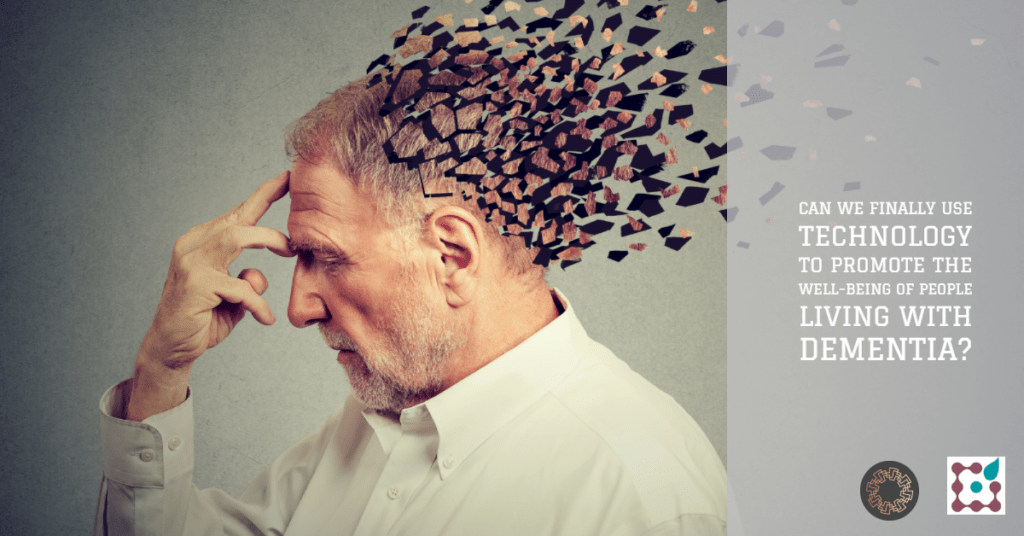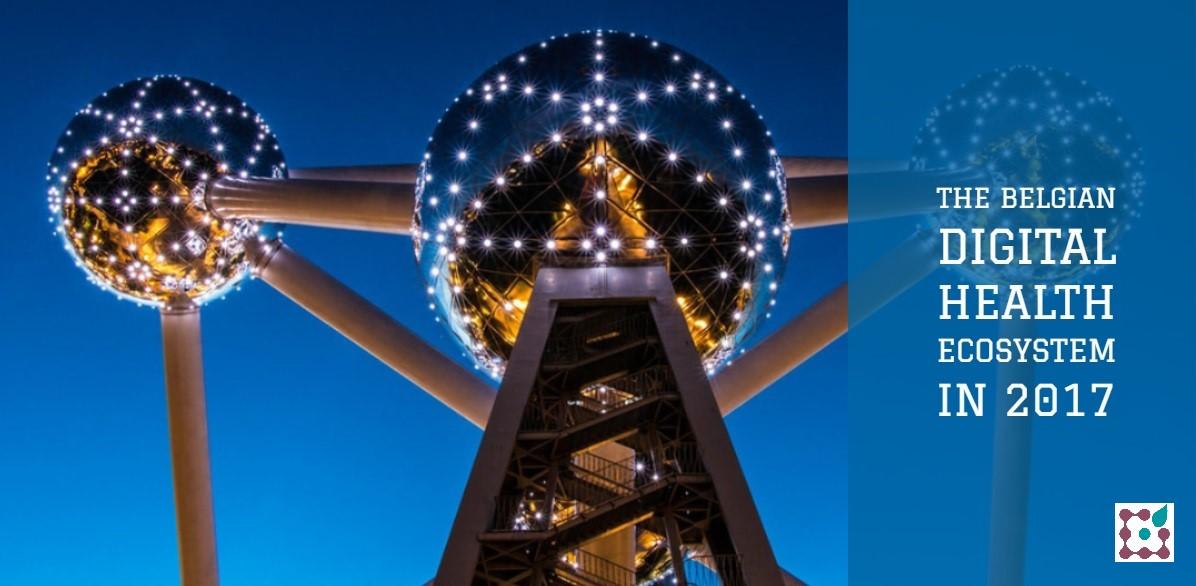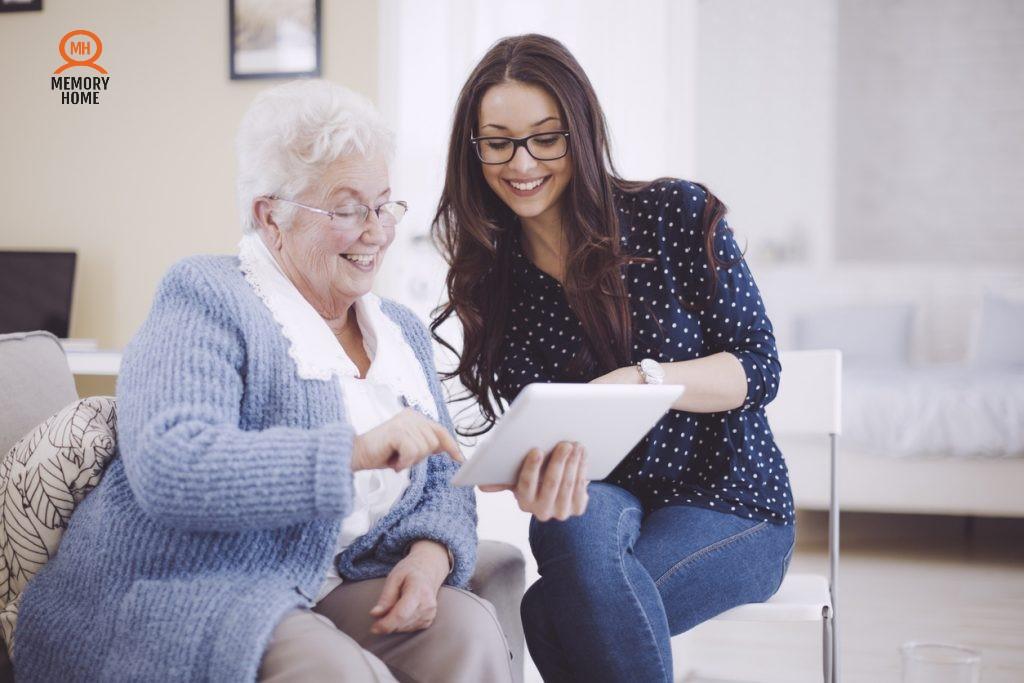What is dementia?
Dementia is an umbrella term that covers a range of medical conditions that cause cognitive deterioration beyond that of normal ageing. This deterioration is severe enough to cause those who suffer from it, to require assistance for basic daily functions.
Dementia is all too often linked to memory loss and grief about what will be lost in the future. In reality, dementia has a lot to do with personality and communication loss, and this is what impacts people and their families the most. We perceive this process all too often as a taboo, as something we want to avoid at all cost.
It might be helpful to take another point of view on dementia in care: many things in life change, but a lot of things do stay possible and we should focus on these because they add to the quality of life of both people with dementia and their caregivers.
What does dementia care look like today?
Globally, there are currently around 50M people living with dementia, with 10M new cases each year. Next to medicines for symptom management (often with unwanted narcotic effects), traditional dementia care often focuses on physical care and group activities. Sometimes sensory stimuli and reminiscence.

Whilst research shows people with dementia need more positive psychological and communication care: they need ‘mental interventions’ tailored to fit their situation and personality.
Care professionals struggle with this: they are aware of this need, but fail to change towards more personalised non-pharmacological support because of:
- care financing and models based on minutes (!) of physical care delivered a day
- customs and daily routines in work
- lack of training in positive psychology care, starting at school
- unfamiliarity with questions of impact and outcomes of care
As governments worldwide encourage people to live at home as long as possible (and since ageing in place is also the preference for most people), the need for health professionals to deliver personalised dementia care becomes stronger.
They need:
- ways to come to earlier detection and diagnosis of dementia in all its forms
- touchpoints with people living at home and their families
- training and support for care professionals and volunteers in this form of care
- permanent and adaptive interventions instead of on-off actions
- solutions to bring daily structure in the life of people with dementia
- tailor-made and personalised therapy for this group of ‘new’ seniors
- tools and information to help migrant seniors with dementia
How can tech help?
We think “dementia tech” or “cognitive care tech” can be useful to help.
Some governments and health care systems have started to encourage the use of technologies to support caregivers and enable better prevention of the ‘negative effects’ of dementia. British NHS, for example, has adopted a new dementia plan tackling these topics.
But there is more: ‘dementia tech’ can help to reach all 7 of the dementia targets the WHO has defined worldwide for 2025: from diagnosis to quality of life.
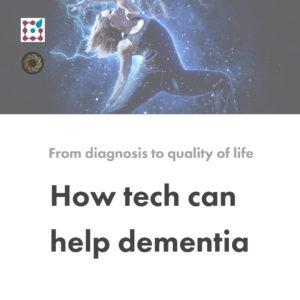
We searched for innovative healthtech startups all over the world, trying to change the field of dementia care and these are our conclusions:
Dementia tech startups are mainly focusing on:
- Prediction, early detection and diagnosis of cognitive impairment and dementia. Diagnosis of all forms of dementia is not easy and is made by a combination of scans, biopsy and paper tests right now. Being able to detect cognitive impairment earlier on is important to have better therapy and drug outcomes.
- Cognitive care: measuring and maintaining memory functions, also after diagnosis. However, monitoring and tracking combined with therapy are still exceptional.
- Assistance for people with dementia living at home: next to the more traditional assistive technologies for everyday life like clocks and medication reminders, we can also see a range of new possibilities by voice technology.
- Creating “happy moments” enhancing the quality of life: they focus on what is possible and what gives joy and understanding to both people with dementia and their (professional) caregivers. They enhance contacts, activities, feelgood for people with dementia and their environment and bring education and support. We do see more and more solutions tailor-made for individuals rather than groups.
- Platforms to find caregivers, volunteers etc: help to find caregivers of any kind to get the flexible help you need, whenever and where you need it. Often with special expertise and attention to dementia care.
Some examples of dementia tech startups
Here you can find examples for each category that attracted our attention.
Most of them were founded less than 5 years ago. About half of these companies are (not yet) VC backed. Israel has some interesting examples.
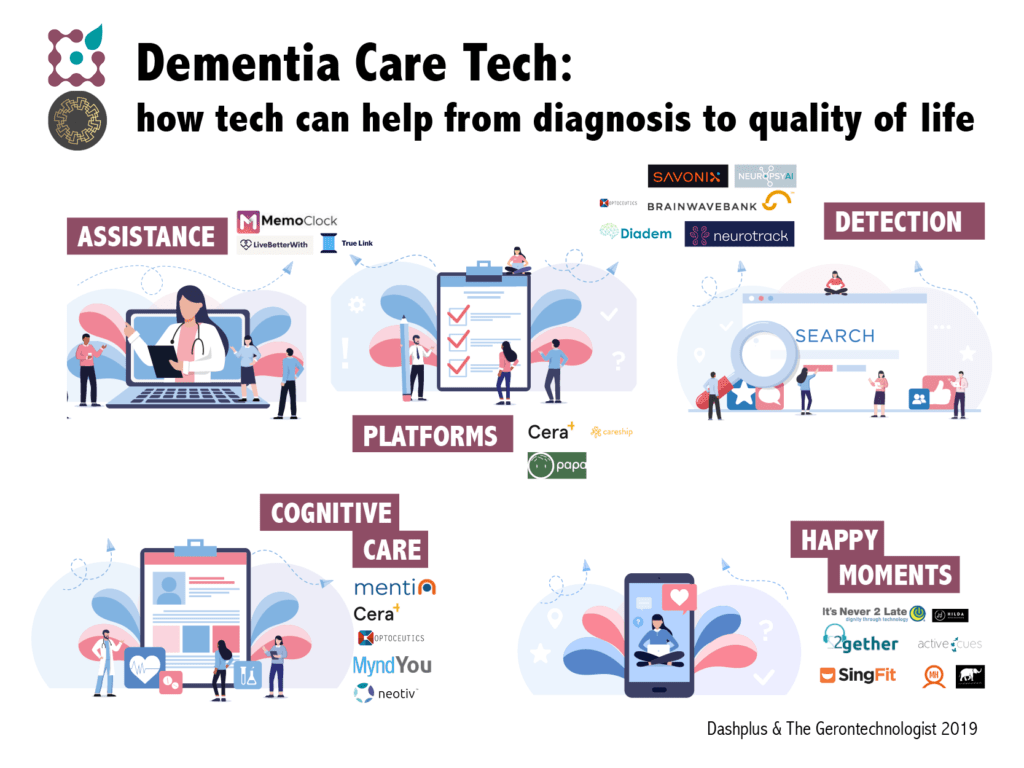
- Neurotrack (US) – developed a cognitive health program to help manage brain health and reduce the risk of future cognitive decline.
- Savonix (US) – developed an actionable and affordable tool for professional cognitive screening.
- Neuropsyai (Portugal)- supports health professionals to have a faster and more accurate diagnosis of neurological and psychiatric diseases
- Diadem (Italy)- Blood test predicting Alzheimer’s disease years in advance
- Cytox Limited (UK)- defining genetic risk for dementia (1)
- Pre-diagnostics (Sweden)-developing a blood test for early Alzheimer’s disease diagnosis
- Admit Therapeutics (Spain)- test for an early AD diagnosis
- BrainwaveBank (Ireland) – makes tech that measures and tracks brain activity. This is designed to help clinical professionals to transform our understanding of brain health and develop the next generation of treatments.
- MyndYou (Israel) – developed technology that passively monitors the cognitive and behavioural function of older adults during their day-to-day lives by analyzing voice and activity.
- Neotiv (Germany) – develops digital solutions for the early detection and follow-up of memory problems.
- Optoceutics (France)-non-invasive light technologies to stimulate the brain and improve cognitive function.
- Mentia (US) – developed a tool that helps care teams and family deliver personalized cognitive care.
Dementia tech is focusing on better, early diagnosis and cognitive care after diagnosis
- MemoClock (Denmark) – developed an app that turns any tablet into a day clock that you can send reminders to.
- Unforgettable (UK) – developed a marketplace with products for people living with dementia.
- Rementis (Netherlands)- is developing an app to turn your tv into a care platform and support for people with dementia living at home.
From support at home to personal quality of life for people with dementia and their caregivers
- It’s Never Too Late (USA) – develops content to help engage people with dementia, reach a range of function levels and interests.
- 2gether (Israel) – developed a tool that helps caregivers connect to their patients/ loved ones using music, and turns music into therapy.
- SingFit (US) – developed SingFit PRIME that turns music into medicine at senior living communities.
- MemoryHome (Belgium) – developed a tool to re-connect with beloved ones through memory palaces.
- Media4care (Germany)- Multimedia therapy and entertainment for people with cognitive dysfunctions.
- Memoera (Finland) – developed cognitive games for people with dementia.
- Hilda (Finland) – developed a reminiscence therapy tool using music people with dementia.
- Memoride (Belgium)- developed a way to keep people with dementia moving by letting them cycle through their past.
- Papa (USA) – developed a platform where older adults can get assistance with a variety of tasks like errands, transportation, etc’.
- Cera Care (UK) – a tech-enabled home care service, partnered with IBM’s watson on ‘lidar sensing’.
- Careship (Germany) – helps older adults and family members find help for everyday tasks.
The bottom line
In 2019, holistic dementia tech solutions are not yet common. There’s no real chain of interventions and solutions caregivers can use for people with dementia.
Health systems, caregivers and care teams will have to integrate from detection to follow up of support of caregivers and creating “happy moments”, all leading to better outcomes for patients.
We do see some examples of holistic interventions, eg a portfolio of tools being used to deliver dementia care, but this is mainly within closed care environments, and not yet along the whole chain of care.
Please feel free to add, comment or contact us for questions about this blog. We’re always happy to get to know new initiatives.
I wrote this article together with Keren Etkin.

About Keren: Keren (Israël) is a gerontologist turned into a technologist and elderly care blogger. On her website, the Gerontechnologist, she writes about all new trends and technologies for the elderly.
Sources
https://www.alz.org/alzheimers-dementia/what-is-dementia, https://www.who.int/news-room/fact-sheets/detail/dementia, Crunchbase, CB Insights and Dealroom
Cover photo: Credits by Depositphotos

